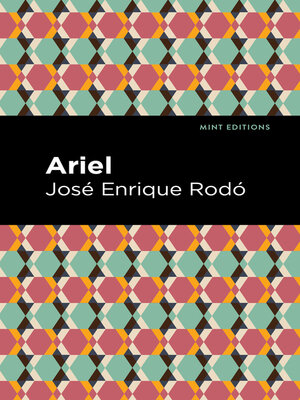Sign up to save your library
With an OverDrive account, you can save your favorite libraries for at-a-glance information about availability. Find out more about OverDrive accounts.
Find this title in Libby, the library reading app by OverDrive.



Search for a digital library with this title
Title found at these libraries:
| Library Name | Distance |
|---|---|
| Loading... |
Ariel (1922) is an essay by José Enrique Rodó. Originally published in Spanish in 1900, Ariel was translated into English just five years after the author's death by F. J. Stimson, the former U. S. Ambassador to Argentina. The essay was immediately influential in Uruguay and across Latin America as an essential document of modernismo, a literary movement which sought to unite classical values and contemporary culture through a devotion to beauty and form. "The gifts of the youthful spirit—enthusiasm and hope—correspond in the harmonies of history and natural history to movement and to light. Wherever you shall turn your eyes you will find these, the natural atmosphere in which move all things that are strong and beautiful." Captivated by a bronze statue of Ariel from Shakespeare's The Tempest, a teacher known as Prospero speaks passionately to his young students on the eve of summer vacation. Taking a historical view of human civilization, José Enrique Rodó applies the teachings of the Enlightenment to the political reality facing Latin America in the early twentieth century. Promoting morality and idealism over the encroaching utilitarianism of North America, Rodó crafted what one critic called "the ethical gospel of the Spanish-speaking new world." This edition of José Enrique Rodó's Ariel is a classic of Uruguayan literature reimagined for modern readers.
Since our inception in 2020, Mint Editions has kept sustainability and innovation at the forefront of our mission. Each and every Mint Edition title gets a fresh, professionally typeset manuscript and a dazzling new cover, all while maintaining the integrity of the original book.
With thousands of titles in our collection, we aim to spotlight diverse public domain works to help them find modern audiences. Mint Editions celebrates a breadth of literary works, curated from both canonical and overlooked classics from writers around the globe.








